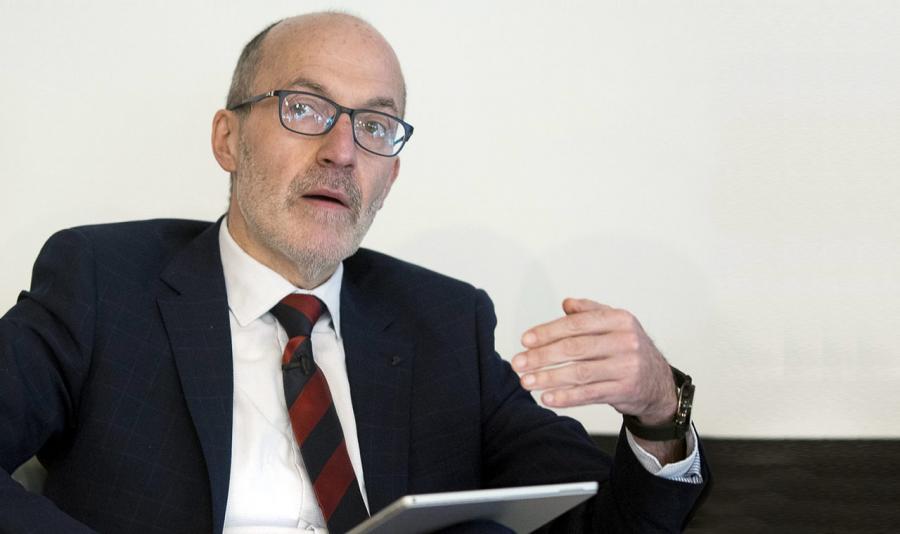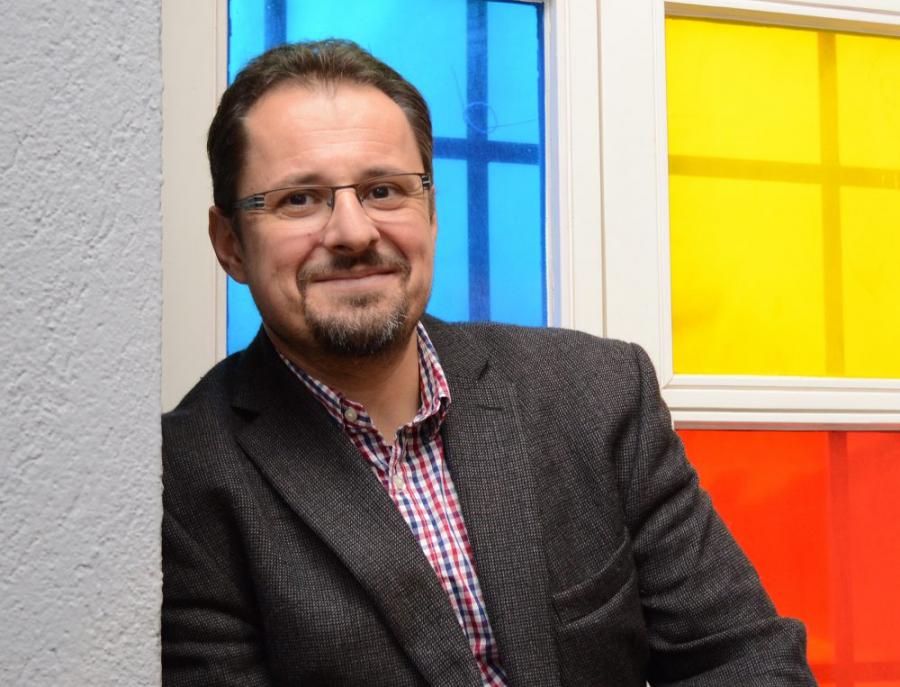Prof. Dr Darío Villanueva
Full professor of Literary Theory and Comparative Literature at the University of Santiago de Compostela
Keywords
Literature

DARÍO VILLANUEVA is Professor of Literary Theory and Comparative Literature at the University of Santiago de Compostela (USC), where he was Rector from 1994 to 2002.
Doctor Honoris causa from universities in Argentina, China, Ecuador, Spain, the United States, Honduras, Nicaragua, Peru, the United Kingdom and Sweden, professor Villanueva has a long academic career in the field of the Humanities. He has held numerous important posts in prestigious institutions. Some of them are Director of the Real Academia Española-RAE (Royal Spanish Academy); a member of the Jury of the Princess of Asturias Award for Letters; President of the Asociación de Academias de la Lengua Española (Association of Spanish Language Academies); Vice-president and President of the Instituto de España (Institute of Spain); Honorary President of the Sociedad Española de Literatura General y Comparada (Spanish Society of General and Comparative Literature); President of the Red de Bibliotecas Universitarias Españolas-REBIUN (Spanish University Library Network); and, an ex officio member of the Consejo de Estado (Council of State), which is the highest consultative body of the Spanish government.
He was also Director of the scientific council of the Biblioteca Virtual Miguel de Cervantes (Miguel de Cervantes Virtual Library); Director of the series Clásicos del Pensamiento Universal (Classics of Universal Thought) of the USC and the Biblioteca Castro (Castro Library). Likewise, he has been a member of the Centro de Estudios Fílmicos-CEFILMUS (Centre for Film Studies) of the USC since its foundation.
As author or co-author of many outstanding literary works, the following works stand out: Trayectoria de la novela hispanoamericana actual (1991) (Trajectory of the current Spanish-American novel) which the Egyptian Higher Council of Culture translated into Arabic; Imágenes de la ciudad. Poesía y cine, de Whitman a Lorca (2015) (Images of the City. Poetry and Film, from Whitman to Lorca), which was recognised with the international prize of humanistic research by the Real Sociedad Menéndez Pelayo (Menendez Pelayo Royal Society); Introducing Comparative Literature. New Trends and Applications (London, 2015), which was translated into Spanish, Arabic and Chinese; and, an English version of De Teorías del realismo literario (Theories of Literary Realism) that was published in 1997 by CUNY Press, New York.
Professor Villanueva also played a key role in the creation, development and consolidation of the Compostela Group of Universities as a network of universities.
Prof. Dr Senén Barro Ameneiro
Full professor of Computer Science and Artificial Intelligence at the University of Santiago de Compostela
Keywords
Computer Science

Prof. Dr Senén Barro holds a degree and PhD (extraordinary award) in Physics from the University of Santiago de Compostela (USC). He is a full professor in the area of Computer Science and Artificial Intelligence since 1995.
He is Scientific Director of CITIUS-Centro Singular de Investigación en Tecnologías Inteligentes (Singular Centre for Research in Intelligent Technologies) at the University of Santiago de Compostela and member of the Royal Galician Academy of Sciences.
He is a founding partner of the spin-offs SITUM Technologies and InVerbis and a winner of the National Computer Science Award José García Santesmases 2020.
Collaborating researcher and researcher responsible for numerous research projects and contracts, he is an editor and author of 7 books and more than 300 scientific articles.
In the past, he was Director of the Department of Electronics and Computer Science of the USC from 1993 to June 2002. He acted as Rector of the USC from 2002 to 2010, a period in which he promoted the research, innovative and entrepreneurial profile of the University and led to the development of the 'Campus Vida' (‘USC Life’), recognised as a Campus of International Excellence in 2009. He was also Vice-president of the CRUE (Conference of Rectors of Spanish Universities) from 2008 to 2010 and President of RedEmprendia from 2010 to 2017, a network of 28 excellent universities from six countries in Latin America, Spain and Portugal, oriented towards the transfer of R&D and university entrepreneurship.
He has also given numerous lectures and conducted research stays in several institutions in the United Kingdom and the United States of America, such as the Department of Engineering Mathematics of the University of Bristol, the Department of Medical Informatics of the Royal Free Hospital, the Electrical Engineering Department of the University of Maryland, the Department of Computer Science and Engineering of the University of South Florida, the Department of Electrical Engineering and Computer Sciences of the University of California, Berkeley.
During his tenure as Rector of the USC, he was a member of the Executive Committee of the Compostela Group of Universities (CGU).
Prof. Dr Istvan Tarrósy
Full Professor of Political Science at the University of Pécs (Hungary).
Keywords
Internationalisation, intercultural learning environment, digitalisation, European Universities Initiative, EDUC.

Prof. Dr Tarrósy is Habil. Full Professor of Political Science and Director of the Africa Research Centre, Department of Political Science and International Studies of the University of Pécs. He is Deputy Head of Department, and Visiting Professor at the Centre for International Studies and Development, Jagiellonian University of Krakow.
Since April 2015, he is the Director of the International Centre of the University of Pécs, being in charge of its Internationalization Strategy.
Prof. Dr Tarrósy combines that position with others with an international scope. Thus, he is a member of the Executive Committee of the Compostela Group of Universities (CGU) since 2018; a Core Member of the Interdisciplinary Doctoral School of the University of Pécs since December 2017; and, Institutional Coordinator of the European University Alliance called “EDUC” (European Digital UniverCity) financed under the EU’s Erasmus+ scheme. Likewise, he acts as the Vice-President of the Africa Sub-Committee of the Hungarian Academy of Sciences. Since 2020, he is co-convenor of the AEGIS Collaborative Research Group ‘Africa in the World’. He is also Editor-in-Chief of the Hungarian Journal of African Studies (Afrika Tanulmányok). book review editor of the Journal of African History, Politics and Society; and, he is owner and director of the independent think-tank IDResearch and research director of several European Integration Fund-supported projects including the UNAOC-BMW Awardee ‘Immigropoly – the migration game’.
Bolyai Research Fellow of the Hungarian Academy of Sciences from 2018 to the present, he was also Fulbright Visiting Scholar and Hungarian Eötvös Postdoctoral Fellow at the Centre for African Studies of the University of Florida (USA) in 2013 and early 2014, and a Japan Foundation Intellectual Fellow at Ryukoku University (Kyoto, Japan) at the end of 2010.
Between 2000 and 2021, he conducted many field research projects and visits in several African and Asian countries, including Tanzania, Kenya, Rwanda, Ethiopia, The Gambia, Egypt, the Democratic Republic of Congo, Botswana, Japan, and the People’s Republic of China, Hong Kong, Thailand and Taiwan.
Prof. Dr Lennart Levi
Emeritus Professor of Psychosocial Medicine at the Karolinska Institute (Sweden).
Keywords
United Nations, Decent work, Occupational health, Global risks, the role of Higher education.

Prof. Dr Lennart Levi is a Professor Emeritus of Psychosocial Medicine. He became one of the most important figure in his field of work at the Karolinska Institute in Stockholm (Sweden).
In 1959, he founded and led the Institute of Stress Research of the Karolinska Institute, which in 1973 was designated the first WHO/OMS Collaborating Centre for Psychosocial Factors and Health.
In 1980, he also founded and led the Swedish National Institute for Psychosocial Factors and Health (IPM). Between 1982 and 2005, he chaired the Occupational Psychiatry Section of the World Psychiatric Association and the International Stress Management Association (ISMA).
In 1995, he became an advisor to the World Health Organisation (OMS), and then to the International Labour Organisation (ILO) and the European Commission (EC).
During the period 2006-2010, he was a Member of the Swedish Parliament and spokesperson on Public Health for the Centre Party.
The University of Santiago de Compostela counts on his collaboration in the group of researchers ‘Laboratory of stress and immunology Lennart Levi’.
His prominent career committed and oriented to the improvement of physical, mental and social wellbeing of entire populations was recognised with the International Prize Grupo Compostela-Xunta de Galicia in 2014.
He has also been awarded the Swedish Royal Medal of Merit, the Hans Selye Award, the Award for Career Achievement from the American Psychological Association and the US National Institute for Occupational Safety and Health, the Swedish Psynk Award for his stubborn and persistent work for mental health, and others.
Prof. Dr Lorena Casal Otero
Professor of Pedagogy and Didactics at the University of Santiago de Compostela
Keywords
Teaching, learning, methodologies, technology, innovation.

Prof. Dr Lorena Casal Otero completed her academic training at the University of Santiago de Compostela (USC). She got a degree in Education Sciences, Pedagogy (2000), and her dissertation modality was recognised with an extraordinary prize (2002). She also holds a diploma in Advanced Studies (2003), a Master's Degree in e-learning ICT for Education and Training (2004) and a PhD in Educational Sciences (2016).
She counts on professional experience in different private and public organisations. In the private company, she worked at Femxa Formación SL (2005-2012) as responsible for Pedagogy, carrying out tasks such as design and management of training plans, design of didactic materials for e-learning, design of teaching methodologies for e-learning, among others.
In the public sector, she was hired by the University of Santiago de Compostela (USC) to be in charge of Research Projects in 2003. Years later, she was engaged as a Substitution Interim Lecturer at the Department of Didactics and School Organisation (2010-2012), Substitution Associate Lecturer at the Department of Didactics and School Organisation (2016-2017), and e-learning Technician at the Centre for Learning Technologies (2012-2017). Her tasks included the management of the university's Virtual Campus, pedagogical advice to university teaching staff on the use of technologies for teaching and learning.
She was director of the USC Centre for Learning Technologies and currently, she is the Vice-dean and Assistant Professor at the Department of Pedagogy and Didactics (Didactics and School Organisation).
Member of the Educational Technology Research Group of the USC, her lines of research include e-learning: Educational possibilities of ICT, Design of multimedia educational materials and virtual teaching-learning environments, Incorporation and uses of ICT in educational institutions, Training and professional development for the use of ICT; and e-inclusion: equal access and participation in the knowledge society.